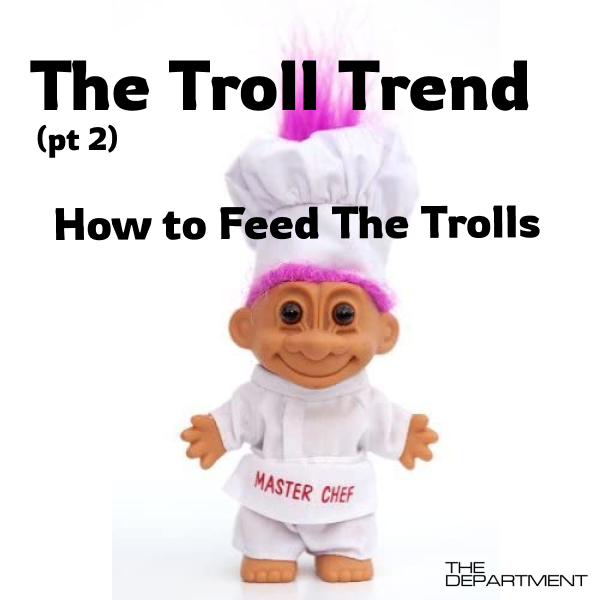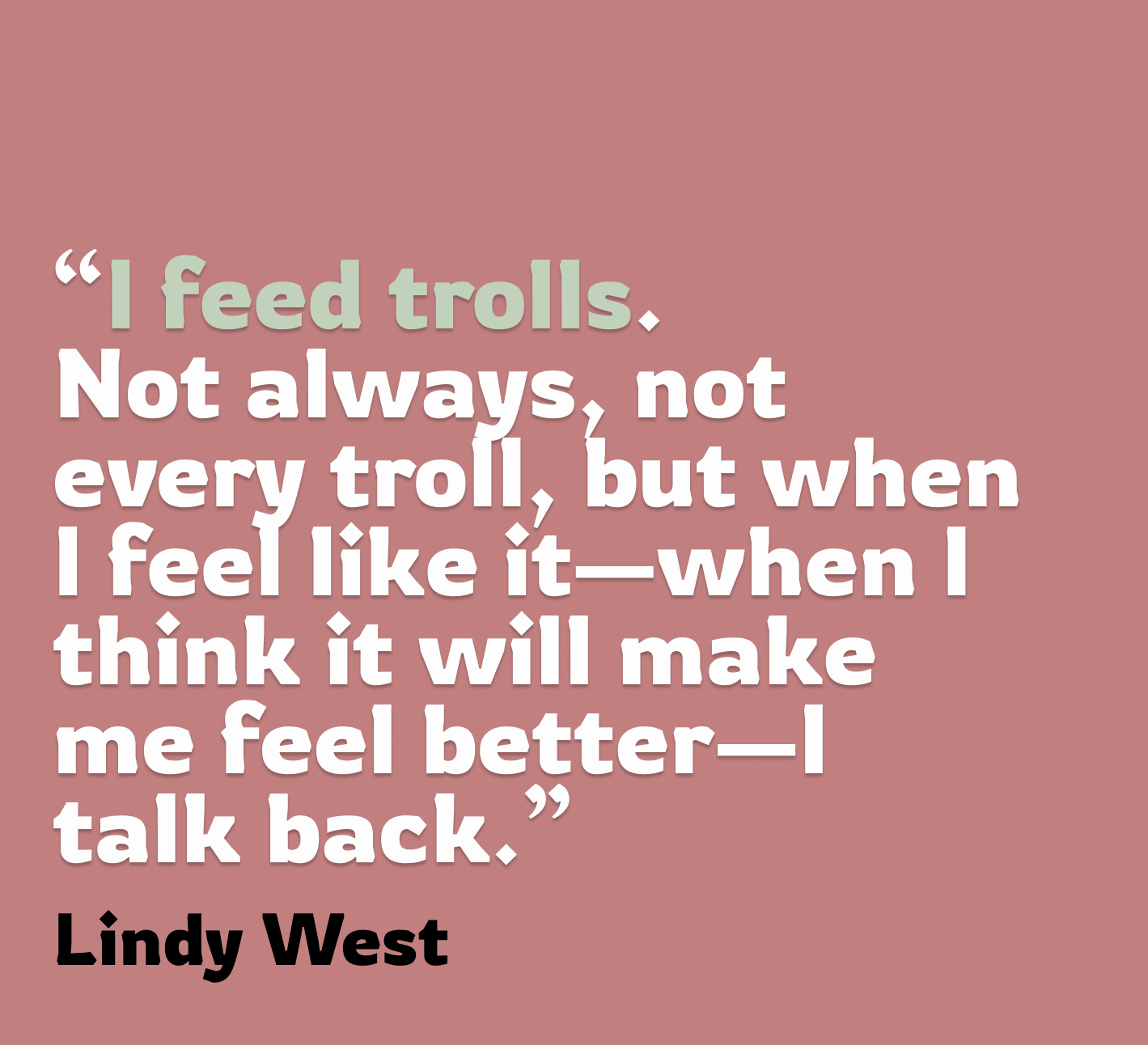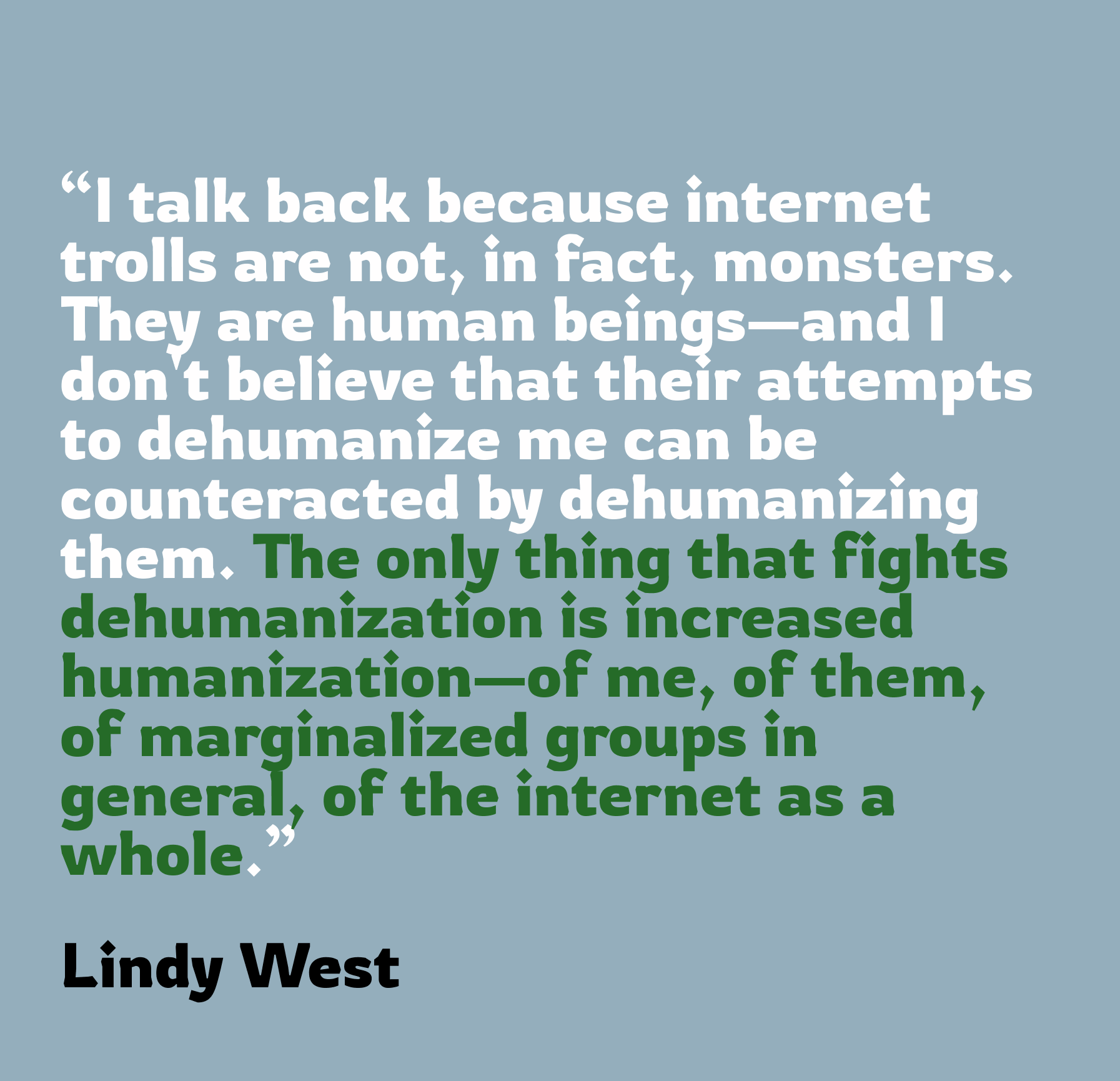︎︎︎episode 49
The Troll Trend (pt 2): How to Feed the Trolls
July 20th, 2021
︎︎︎︎ Listen on Apple
︎︎︎︎ Listen of Spotify
︎︎︎︎ Listen on Stitcher

“To feed the trolls or not feed the trolls?” This is something the entire internet is debating (when they aren’t debating whether or not Crocs are cute)
If you’re unfamiliar with the term “feed the trolls,” don’t worry, because as in all things important in life, Urban Dictionary is here to help you, defining “feeding the trolls” as:
“When you reply to a troll or group of trolls on the internet, usually angrily and while showing signs of being offended.
When you do this, you give the trolls the attention that they crave. You're responding in the way that the troll wants you to respond. You get upset over something that someone posted on the internet.”
There are a lot of definitions for “feeding the trolls” on Urban Dictionary, but they all make the same points:
- Reacting to a troll on any level just “encourages” them and gives them “what they want.”
- It’s fundamentally embarrassing to react to a troll/it’s our job to “go high when they go low, “ a la Michelle Obama.
- When we encounter a troll, rather than engaging, we should simply report them to the moderator or the social media service. I’m just going to go ahead and say here that on Facebook (where I rarely post but participate in a lot of groups), I am report-aholic. I see how trolling negatively affects my own mental health (even just observing it) and I don’t want others to have to deal with it.
So let’s start with Urban Dictionary’s advice here...not feeding the trolls by ignoring them and reporting them to moderators/etc…
One of the places where I have *never* had success reporting harassment/trolling when I witness it is Instagram! Instagram will pull a post immediately if there’s a hint of nipple, but I’ve never seen true bullying and harassment dealt with in a useful way. I reported some people who were sending me harassing/threatening messages about vegan leather (and yes, it made me feel like a narc), and all Instagram suggested to me was to just block those people. But what’s to stop the from creating a new account to threaten me or using their friends’ accounts to harass me?
IG feels like the slipperiest and easiest place for trolling because you can just create a “finsta” account devoted solely to trolling and spying on your exes! And if that one gets called out, you can just create ANOTHER ACCOUNT.
Instagram IS testing a new feature called Limits that will allow you to restrict abusive and harassing comments from groups. It’s currently in the testing phase, so it is limited to select users right now, but it seems like a useful tool. The app will recommend groups of accounts that you may want to limit comments and messages from. You will also get the option to select whether you want to limit accounts that are not a part of your followers or are your recent followers. After you choose who you want to limit, then you won’t see comments/messages from those individuals. But this puts the responsibility of safety on you, not on people who want to abuse you. So it doesn’t hold trolls accountable. One criticism I encountered time and time again across the internet as I researched trolls is that Instagram has a long way to go in terms of fighting hate speech, harassment, and abuse on its platform. Many, many, MANY people have found themselves reporting abuse on IG....and then they have found no solution or outcome. Basically just either they never hear back from IG or they receive a message saying that it doesn’t qualify as abuse. And this conversation about IG goes back years! It’s not a new problem, but IG just isn’t prioritizing.
A 2018 article from The Atlantic called “Instagram Has a Massive Harassment Problem,” by Taylor Lorenz confronts the reality of harassment on Instagram: the company is prioritizing growth over its users. And users with a few follows and millions of followers alike are experiencing the repercussions.
Instagram has done a few PR campaigns over the past few years expressing its commitment to ending online bullying, but it hasn’t really done anything tangible to change the status quo. One Instagram employee Lorenz that Instagram’s anti-bullying rhetoric “doesn’t seem connected to what’s actually going on in the company.” Another employee said,”The focus is still on getting people to spend more time, getting more users, getting more revenue. That doesn’t change much internally. There’s been a lot of effort to shape the narrative, but the reality is that it doesn’t drive business impact.”
I will say that I do feel that my reports are taken seriously on facebook and reddit. So I know some platforms are doing a better job than others.
So yes, take Urban Dictionary’s advice about reporting trolling, but don’t get your hopes up that it’s going to change anything. Just block, block, and block some more. But ignoring them is hard, because most importantly, it doesn’t seem to work. In fact, it allows people who engage in shitty behavior on the internet, who hurt others, to feel like it’s okay and excusable. Well, it’s not!
I read an amazing essay called “DON’T FEED THE TROLLS, AND OTHER HIDEOUS LIES,” from The Verge that really nails it for me, that feeling that it is just fundamentally unfair and incredibly naive to advise us to just ignore the trolls and carry on with life as if nothing bad happened:
“The premise of ‘don’t feed the trolls’ implies that if you ignore a troll, they will inevitably get bored or say, ‘Oh, you didn’t nibble at my bait? Good play, sir!’ and tip their cap and go on their way. Ask anyone who has dealt with persistent harassment online, especially women: this is not usually what happens. Instead, the harasser keeps pushing and pushing to get the reaction they want with even more tenacity and intensity. It’s the same pattern on display in the litany of abusers and stalkers, both online and off, who escalate to more dangerous and threatening behavior when they feel like they are being ignored. In many cases, ignoring a troll can carry just as dear a price as provocation.”
This essay goes on to liken trolling to a missing step in a stairwell. Most people will just hop over it and kinda get used to it after a couple of times. Any time a new person approaches the stairwell and mentions that missing step, maybe even referring to as a “dangerous,” they will be seen as sort of worry wart, alarmist, ninny! Over time, people will be like “Ugh Kim is so annoying with her insistence that we fix that stair.” Except….that missing step IS big deal to people with mobility issues who can’t just leap over it. People in slippery shoes or high heels. People with wet shoes or crutches or weak ankles or who are just carrying a bunch of coffees for their coworkers.
Trolling is that missing step...it’s easy to ignore if you maybe already have the option of taking the elevator instead.. But for women, LGBTQ+ individuals, people of color, anyone who doesn’t look like our media’s standards of beauty...it’s not even just one missing step, it’s lots and lots of missing steps, with rusty nails sticking out everywhere. And none of those people have access to the elevator that allows them to skip those broken stairs!
Furthermore, telling us to “ignore” the trolls, to “not feed them,” ignores the most frightening fact of all: that yes, many jerks on the internet are decent people behaving badly, but a lot of others are just there to be sadistic. And whether the troll is a decent person having a bad day or a true monster, trolling affects both the person being trolled and the community around them in really terrible ways. This same essay from The Verge goes on to say, “ the more tangible effect [of ignoring trolls] is to silence the victim and the reality of their abuse, or worse, to blame them for it. For far too many who promoted this idea, the true goal was silence, to avoid facing what is happening and the impossible responsibility of it.”
The writer of this essay--and a lot of other people across the internet feel that the way to truly stop trolling is to hold the trolls accountable, via bans and account suspensions, rather than just expecting their targets to just suck it up and ignore it. But banning and suspending accounts leads to DRAMA, boycotts, lost revenue...just look at all the MAGA people who lost their shit when Trump was banned from Facebook and Twitter! Holding trolls accountable can be bad for business, when you’re okay with bad people being your customers.
So let’s talk about “feeding” the trolls...aka confronting them.
Let’s talk about Shrill, which has a famous trolling arc. Kim, want to tell everyone what happens on Shrill?
So while Shrill stars Aidy Bryant, it’s actually based on writer Lindy West’s stories. And IRL, West has had to deal with trolls all day/everyday as she writes about #feminist stuff, which you know, gets trolls riled up. This trolling hit an apex when someone created a twitter that alleged to be her recently deceased father, using his photo and the user name “PawWestDonezo.” The bio read“Embarrassed father of an idiot. Other two kids are fine, though.” His location was “Dirt hole in Seattle”.
Of course everyone told West to ignore this guy. She told The Guardian:
“Over and over, those of us who work on the internet are told, “Don’t feed the trolls. Don’t talk back. It’s what they want.” But is that true? Does ignoring trolls actually stop trolling? Can somebody show me concrete numbers on that? Anecdotally, I’ve ignored far more trolls than I’ve “fed”, and my inbox hasn’t become any quieter. When I speak my mind and receive a howling hurricane of abuse in return, it doesn’t feel like a plea for my attention – it feels like a demand for my silence.
And some trolls are explicit about it. “If you can’t handle it, get off the internet.” That’s a persistent refrain my colleagues and I hear when we confront our harassers. But why? Why don’t YOU get off the internet? Why should I have to rearrange my life – and change careers, essentially – because you wet your pants every time a woman talks?
So what did she do? She wrote an essay about it for Jezebel called “Don’t Ignore the Trolls, Feed Them Until They Explode.” She said, “when we ignore the issue—leaving trolls to twist in the wind—not only does it not fix anything, it actively hurts us. It poisons healthy conversations. And, more specifically, it actively drives women off the internet and out of the conversation and back into our ‘safe spaces’—which is exactly what the trolls want. They want us to shut up. They want us out of their territory.” The argument is essentially: when we ignore trolls, we poison our culture, our world, the internet belongs to us too...let’s fight for it!



So guess what? West writes that Jezebel essay...and she gets an email from her troll! He says:
Hey Lindy, I don’t know why or even when I started trolling you. It wasn’t because of your stance on rape jokes. I don’t find them funny either.
I think my anger towards you stems from your happiness with your own being. It offended me because it served to highlight my unhappiness with my own self.
I have e-mailed you through 2 other gmail accounts just to send you idiotic insults.
I apologize for that.
I created the PaulWestDunzo@gmail.com account & Twitter account. (I have deleted both.)
I can’t say sorry enough.
It was the lowest thing I had ever done. When you included it in your latest Jezebel article it finally hit me. There is a living, breathing human being who is reading this shit. I am attacking someone who never harmed me in any way. And for no reason whatsoever.
I’m done being a troll.
Again I apologize.
I made donation in memory to your dad.
I wish you the best.
There is an amazing episode of This American Life where West actually talks to this guy and it’s amazing. The segment is called “Ask Not For Whom The Bell Trolls; It Trolls for Thee,” and we will definitely link to it in the show notes. Kim, have you listened to this?
I have my own story about “feeding trolls” and it harkens back to the MySpace era. It involves head lice, hair dye, and Dylan.
Kim, have you heard about all of this stuff with Chrissy Teigen? Bullying Courtney Stodden, telling them they wished they would die, wishing they would commit suicide.
"I was a troll, full stop. And I am so sorry."
Let’s talk about how to avoid being a troll ourselves:
- Be aware that you are saying these things to an actual real person JUST LIKE YOU.
- How would you feel to hear these words?
- Would you say this to someone’s face?
- Is there a better way to say what you’re saying and do you really need to say it at all?
- Take a cooling off period. Wait a few hours and see if you still feel like lashing out. Reread the post/caption that riled you up in the first place. Maybe you didn’t read it all...check it out.
- Ask yourself: what is my intended outcome here? Do I want to correct someone? Have a dialogue about something we disagree on? Or am I just angry? Can there be a good outcome by confronting this person here?
- Another thing to ponder: would you be embarrassed if someone you care about saw what you said in that DM or comment?
- Recognize that you don’t always have to get the last word. And that some (most) problems will never solved via social media. But if it’s a subject or cause you’re really passionate about, get involved in your community. Make a donation!
- If you know that something someone is saying is fundamentally untrue, send them links to the correct information. Knowledge is power! And some people just don’t know how to get to the right information.
